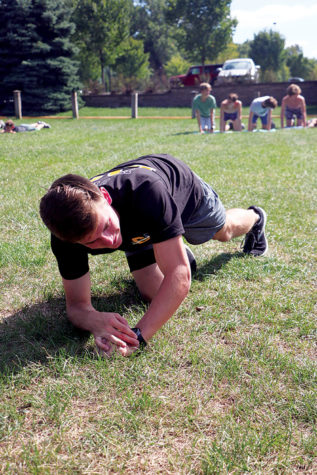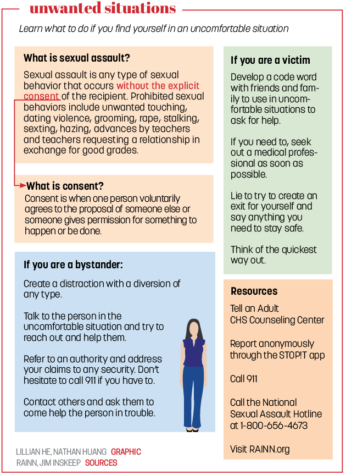Logan Sandlin, varsity track and junior varsity cross-country runner and senior, sits among his teammates in the auditorium before practice as he listens to the “Step Up to Stop Sexual Assault” presentation. The presentation is a new program being presented to the athletics and performing arts departments and student government this year by the law firm Church Church Hittle + Antrim in coordination with the school’s administration. The program aims to define sexual assault, the elements of consent, rules and laws pertaining to sexual assault and how to identify unhealthy relationships.
 “I think the whole sexual assault presentation is a good idea because it just gets that idea (of prevention) out there and it covered a lot of stuff that a lot of people might not have known before seeing the presentation,” said Sandlin. “It gave examples of different consequences, like if you’re convicted of sexual assault, you have to go on the registered sex offender list and then that can destroy your life because you can’t get a job and a lot of schools won’t accept you.”
“I think the whole sexual assault presentation is a good idea because it just gets that idea (of prevention) out there and it covered a lot of stuff that a lot of people might not have known before seeing the presentation,” said Sandlin. “It gave examples of different consequences, like if you’re convicted of sexual assault, you have to go on the registered sex offender list and then that can destroy your life because you can’t get a job and a lot of schools won’t accept you.”
According to Superintendent Dr. Michael Beresford, the main mission of the program is to educate students so they will do the right thing when the time comes. Beresford said this is done by empowering students and equipping them with the knowledge to know when an uncomfortable situation requires action.
“The whole idea is to give tools where if (students) are in a weird situation where they feel uncomfortable, they can report it,” Beresford said. “Or if you have a friend who’s getting into a bad relationship or an unhealthy relationship, you understand that you have some tools to use to help. It’s another layer of school safety.”
While there was no specific change to spark the implementation of this program, Principal Thomas Harmas said that despite this school’s administration being educated about these issues for many years, this specific conversation still needed to be presented to the student body because of uncomfortable situations students might find themselves in.
“We talk about in high school that the interaction between classmates is often guess work. What we’re trying to do with (this program) is take the guesswork out of it and make it plain and simple,” Harmas said. “If (students) have the information, they know the difference between right and wrong, and so that grey area is taken away.”

Logan Sandlin, varsity track and junior varsity cross country member and senior, does exercises during practice. His participation in sports required him to attend the “Step Up to Sexual Assault” presentation this year.
Sandlin said he appreciates how the program outlines and defines what qualifies as sexual assault or sexual harassment because of how easily certain interactions between classmates can become inappropriate due to lack of information on the subject.
“I think no matter what it’ll still be an issue, but I think the presentation clarified some things about sexual harassment that’ll make it less of an issue. Because some things that people think of as normal could, in the eyes of the law, be considered sexual harassment,” Sandlin said. “There are certain things that, in high school especially, that some people see as normal, things that could be considered sexual harassment.”
In regards to who the program is presented to right now, “Step Up to Stop Sexual Assault” is primarily being presented to the athletics and performing arts departments and student government as a way of testing student reactions to the program. While the formation of the program began during the second semester of the 2018-19 school year with several focus groups that included both students and adults, administrators decided that presenting the program to these larger groups will allow for more widespread feedback before deciding whether to make the program mandatory for the entire student body in the future.
Harmas said, “We thought that with how close those groups are and the opportunities those groups have for overnight stays and things like that, that those would be the good groups to start off with. We’re looking in the future to be able to present this to the student body in some way. (We’re) not sure exactly what that would look like at this point because of logistics, but look at it like this: With our athletics and our band and our performing arts groups, our Senate and House and so forth, we’re talking over 2,000 kids. Probably half of our population are getting (the presentation) at this point.”
 Sandlin said that while sexual assault is an important topic that needs to be covered for every student, he hopes the program will be available for the entire student body in the future. At the beginning of each school year or athletic season, students who participate in certain extracurriculars and electives, such as a sport, performing art, or a form of student government, are required to sign consent form stating that if a student participates in an illegal activity, they will be removed from said activity. Because of this consent form, Sandlin said he believes members of these groups are less likely to commit sexual assault.
Sandlin said that while sexual assault is an important topic that needs to be covered for every student, he hopes the program will be available for the entire student body in the future. At the beginning of each school year or athletic season, students who participate in certain extracurriculars and electives, such as a sport, performing art, or a form of student government, are required to sign consent form stating that if a student participates in an illegal activity, they will be removed from said activity. Because of this consent form, Sandlin said he believes members of these groups are less likely to commit sexual assault.
Beresford said a major detail that will need to be refined is how the program could be tailored to be presented to the entire student body in the future, hopefully starting with the 2020-2021 freshman class. For now, the administration is working to have an open night for any students who wish to see the presentation but have not already. In the meantime, the administrators mainly hope to see an increase in student safety from this program.
“We’ll do anything to help keep kids safe,” Beresford said. “People ask if students’ safety is a priority in Carmel Clay Schools. I say no, because priorities change. It’s a core value. Core values are things that are important all the time.”
Read a Q & A from Athletics Director Jim Inskeep and speakups from students here

































![AI in films like "The Brutalist" is convenient, but shouldn’t take priority [opinion]](https://hilite.org/wp-content/uploads/2025/02/catherine-cover-1200x471.jpg)








































![Review: “The Immortal Soul Salvage Yard:” A criminally underrated poetry collection [MUSE]](https://hilite.org/wp-content/uploads/2025/03/71cju6TvqmL._AC_UF10001000_QL80_.jpg)
![Review: "Dog Man" is Unapologetically Chaotic [MUSE]](https://hilite.org/wp-content/uploads/2025/03/dogman-1200x700.jpg)
![Review: "Ne Zha 2": The WeChat family reunion I didn’t know I needed [MUSE]](https://hilite.org/wp-content/uploads/2025/03/unnamed-4.png)
![Review in Print: Maripaz Villar brings a delightfully unique style to the world of WEBTOON [MUSE]](https://hilite.org/wp-content/uploads/2023/12/maripazcover-1200x960.jpg)
![Review: “The Sword of Kaigen” is a masterpiece [MUSE]](https://hilite.org/wp-content/uploads/2023/11/Screenshot-2023-11-26-201051.png)
![Review: Gateron Oil Kings, great linear switches, okay price [MUSE]](https://hilite.org/wp-content/uploads/2023/11/Screenshot-2023-11-26-200553.png)
![Review: “A Haunting in Venice” is a significant improvement from other Agatha Christie adaptations [MUSE]](https://hilite.org/wp-content/uploads/2023/11/e7ee2938a6d422669771bce6d8088521.jpg)
![Review: A Thanksgiving story from elementary school, still just as interesting [MUSE]](https://hilite.org/wp-content/uploads/2023/11/Screenshot-2023-11-26-195514-987x1200.png)
![Review: "When I Fly Towards You", cute, uplifting youth drama [MUSE]](https://hilite.org/wp-content/uploads/2023/09/When-I-Fly-Towards-You-Chinese-drama.png)
![Postcards from Muse: Hawaii Travel Diary [MUSE]](https://hilite.org/wp-content/uploads/2023/09/My-project-1-1200x1200.jpg)
![Review: "Ladybug & Cat Noir: The Movie," departure from original show [MUSE]](https://hilite.org/wp-content/uploads/2023/09/Ladybug__Cat_Noir_-_The_Movie_poster.jpg)
![Review in Print: "Hidden Love" is the cute, uplifting drama everyone needs [MUSE]](https://hilite.org/wp-content/uploads/2023/09/hiddenlovecover-e1693597208225-1030x1200.png)
![Review in Print: "Heartstopper" is the heartwarming queer romance we all need [MUSE]](https://hilite.org/wp-content/uploads/2023/08/museheartstoppercover-1200x654.png)




